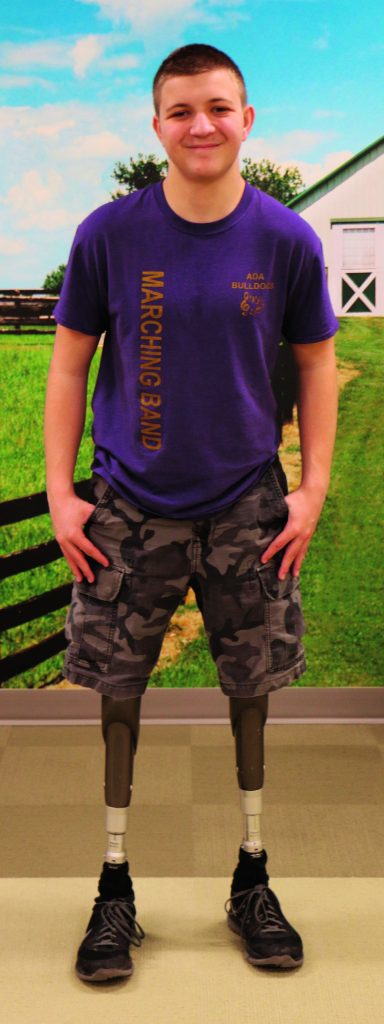 LEXINGTON Three days shy of his first birthday, Theo underwent an above the knee amputation on both legs. The surgery was performed at Shriners Hospitals for Children — Erie, Pennsylvania. Theo was born with bilateral tibial hemimelia, type 5B, which means he was born without tibia bones, the larger weight bearing bones in the lower leg and the second largest bones in the body. They makes up both the knee and ankle joints, and are most commonly referred to as the “shinbones.”
LEXINGTON Three days shy of his first birthday, Theo underwent an above the knee amputation on both legs. The surgery was performed at Shriners Hospitals for Children — Erie, Pennsylvania. Theo was born with bilateral tibial hemimelia, type 5B, which means he was born without tibia bones, the larger weight bearing bones in the lower leg and the second largest bones in the body. They makes up both the knee and ankle joints, and are most commonly referred to as the “shinbones.”
According to an article in the Journal of Children’s Orthopaedics, tibial hemimelia is one of the rarest congenital lower-limb deformities, and the chances of a child being born with this condition is estimated to be one in one million live births. Of those children, bilateral tibial hemimelia, meaning both legs involved, has only been reported in roughly 30 percent.

Today, Theo is a 16-year old who has defied all odds. Theo’s family moved in 2006 and transferred his care to Janet Walker, MD, pediatric orthopedic surgeon, and Chris Burke, CP/LP, prosthetist, at Shriners Hospitals for Children Medical Center — Lexington. Over the course of Theo’s care at the Lexington Shriners Medical Center, he has received nine sets of prosthetic legs, running blades and other important prosthetic components.
Walker is board certified by the American Board of Orthopaedic Surgery and is a professor of pediatric orthopedic surgery and pediatrics at UK. She earned a medical degree from University of South Florida College of Medicine. Walker completed her residency in orthopedic surgery at University of South Florida College of Medicine and a fellowship in pediatric orthopedics at the Hospital for Sick Children. She received additional training in limb lengthening at Gavil IIizarov in Kurgan, Russia.
“While Theo has only required his one amputation surgery, keeping up with his growth and activity needs has been a challenge,” said Dr. Walker. “This is where our multi-disciplinary prosthetic team works best. While I write the prescription for Theo’s prostheses, I need ongoing input from our prosthetists, physical and occupational therapists, and nurses to make sure each of our patients get the best equipment for their individual needs. All of these professionals are on-site during our prosthetics clinic, facilitating our team collaboration.”
Theo began to swing his regular prosthetic legs so that he would feel a sensation like running. He taught himself to snap upright from a bent waist to jump off the ground. While Theo realized that he was not technically running or jumping, he wanted to be able to do these things. He talked to Chris Burke about achieving his dream of joining the seventh-grade junior high track team. Chris went to work on building running blades for Theo that were custom fabricated to his body, needs, and purpose. Running blades are large C-curve prosthetic feet that are extremely responsive prosthetic lower-limb devices. They allow individuals to run short or long distances with added functionality. Theo put his running blades on for the first time, he was running and jumping within five minutes.
Theo started to wear the running blades whenever a good opportunity presented itself. He wore the blades to summer camp, junior high physical education classes, junior high track, and during a 5K race. His sprint times were fast compared to national standards. In 2018, Theo’s parents took him to several adaptive track and field events, where he was able to see first-hand how successful and strong he was compared to other athletes with a similar disability. Theo qualified for the Junior National Adaptive Track and Field Championships, and went on to achieve first place, setting a record in his disability and age category for all events in which he participated.
“Not only does Chris know how to make Theo’s legs fit perfectly to his body, he has shown an ability to work with Theo at all stages of his development,” said Suzanne, Theo’s mom. “He taught me and Theo’s dad how to use and fix Theo’s first set of legs with knees that bend. He helped make Theo’s legs comfortable for a full day of sitting in a desk when he started elementary school. Chris helped Theo run and jump in middle school. And, Chris continues to teach Theo, now that he is a teenager, how to properly care for the legs, which is especially helpful because teenagers would prefer to listen to someone who is not their parent!”
Theo knows he cannot grow legs, and he believes he might as well just move forward with what he can do instead of being frustrated by what he cannot do. Many things come easy to Theo, but when asked about something that is difficult, he mentioned walking. “Walking, particularly in tight spaces, is not easy,” said Theo, but he enjoys the challenge of finding ways to overcome the difficulty.
Theo and his parents drive four hours one-way to receive pediatric orthopedic specialty care at the Lexington Shriners Medical Center. “We appreciate the extra effort that everyone makes to ensure that Theo is as successful as he can be with everything that he tries. While everyone at Shriners Medical Center is considered an expert in their field, they are always willing to work with the patients and listen to the parents who are experts in their child,” Suzanne said. “The goal of everyone at Shriners Medical Center is to help patients reach their goals, period. In all of our years of receiving care from Shriners Hospitals, we have gladly driven the four hours to have Theo’s legs fixed.”
Theo is headed to college in 2020, and whether he pursues his elementary school dream of being one of the first legless astronauts on Mars, or something else, remains to be seen. “I wouldn’t be surprised in the least bit if he earned a PhD,” said Suzanne.


